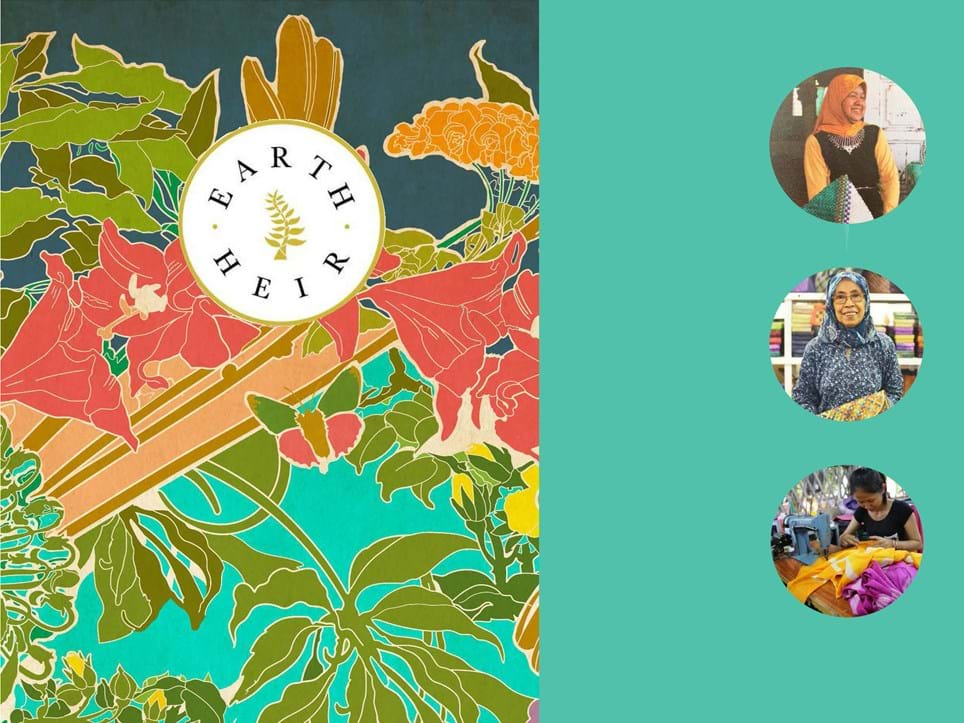Sasibai Kimis’ accessories brand, Earth Heir, is founded on the pillars of thoughtful design, ethical partnerships and conscious consumption; every fibre of the brand is for the greater good.
The brainchild of business grad Sasibai, it was after visiting her Malaysian hometown – where she met local women struggling to make a living from their craft – that she felt compelled to use her business skills to give artisans a platform to live with dignity. Simultaneously fighting poverty while encouraging ethical practice, Earth Heir has impacted over 500 artisans from women’s cooperatives, indigenous tribes and refugee group – generating over £100,000 income for the workers.
Keeping heritage craft alive is also at the core of Earth Heir’s ambition: the brand plays a vital role in preserving skills that are otherwise at risk of being forgotten. Its jewellery uses intricate cross-stitch embroidery on earrings, necklaces, bangles and cuffs within collections that spotlight unique cultural narratives and skills of the refugee artisans.
This World Refugee Day, ahead of Earth Heir’s showcase at the WeWork World Refugee Week Festival at Devonshire Square, we learned more about the brand and its goals.
Can you give us a personal story of one of the refugee women artisans you work with and what products she worked on?
Name: *Salma (not her real name)
"I grew up as a refugee in Iran. I hated going to school. My classmates laughed at me because I was poor and a refugee. When I grew up I went back to Afghanistan.
I was a primary school teacher in a village in Afghanistan, seven hours from Kabul. I loved teaching, but we also didn’t have a good situation there. Our compatriots didn’t want us and our government was very very bad, even worse than in the past. There were people going after my husband.
We escaped to Malaysia last year with my two young daughters, my father-in-law and my mother-in-law. Here also we don’t have permission to work and a lot of problems about money, health, mind. I can’t see a good future. I cannot go back anywhere, I never had a home or country. You know I think the worst thing in the world is you feel you belong to no place."
We have been working with *Salma for the last 2 years, I have seen her demeanour change over time, she now smiles more and she has brought her family to meet with us. She is one of our best and most dedicated artisans – and she is blooming as a designer herself.
How do you discover the artisan talents that you end up working with?
For the MADE51 project, the refugee artisans in Malaysia are connected to us through the UN Refugee Agency, as all refugees have to have a valid UNHCR registration card. For the Malaysian artisans, initially it was through me travelling to communities throughout Malaysia and building relationships with stakeholders; now it’s a combination of us searching for new artisans together with artisans and community groups reaching out to us.
For example, an NGO working with an indigenous group may reach out to us if they find artisans in the community they are working in. The process of integrating an artisan with Earth Heir takes up to a year, as not all artisans are open to new ideas and innovating on their products or processes. Right now, we are working with a network of 120 artisans in Malaysia, working with different raw materials and techniques.
Ahead of your speech for world refugee day with UNHCR, what is a key takeaway you are hoping to share with them and us?
Working with refugees from diverse cultures through the MADE51 initiative, I have been humbled by the incredible talent, determination and perseverance refugees have. We wanted to create a range of products that reflect the beauty, strength and dignity of the women who made them – to move the conversation away from charity to someone buying it for the beauty of the product – and to empower the maker. This perspective gives the artisans dignity – to earn a living with dignity, a basic human desire.
How can we make more conscious decisions when it comes to buying things?
There are of course many layers to this – and how far one wants to go. It can be as simple as reading labels, trying to understand where and how a product was made, buying natural fibres, buying pieces which will last a long time both in terms of quality and style and being intentional with why we need something before buying it.
What’s your current favourite product in your collections that’s on earth Heir?
My current favourites are our new cuff bracelets and my trusty yellow Diana bag. I travel everywhere with them.
Also on Because London:
+ We're glowing with Pride at Herbivore's botanical best-seller.
+ Explore in-store at Bella Freud's flagship.
+ We love this week's #WCW for her support of creative women.











